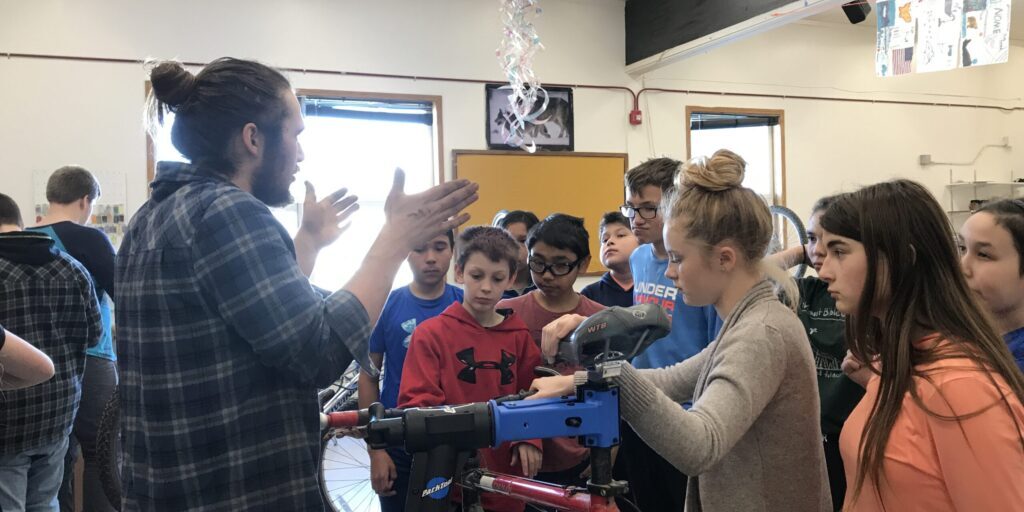A two-week bicycle workshop held last month at the Anvil City Science Academy (ACSA) in Nome taught kids about bike safety and how to fix bikes that, at first glance, might look beyond repair.
The pilot class set the stage for a future project to redistribute bikes fixed up by kids, to community members in need.
KNOM’s Katie Kazmierski reports:
A student squints at a bike in the workshop at Anvil City Science Academy, and he says, “it looks like you found that bike in a dump.”
Its chain is broken and rusty. The breaks don’t connect properly. The student is right: it very well could’ve been found in a dump. But that’s part of the point of this class, an initiative by Nome teacher Jeff Collins: to take bikes that otherwise would head to the landfill and make them usable. His two-week elective course showed kids hands-on how to do just that, with help from Susitna Bike Institute and Charlie Lowell.
“And then I’m gonna spin the wheel… [sound of wheel spinning] …everyone see what the wheel is doing right here? [kids say ‘yeah’] It’s dancing, right? It’s, like, doing a crazy jiggle… and what I’m gonna do, is I’m going to show you… [spinning stops]… the rim should be right in the middle of the frame…”
Kids huddle around visiting instructor Lowell as he gives them a lesson in bike mechanics. He’s the Director of Youth Programs at Susitna Bike Institute in Anchorage. Lowell says this is the second time the nonprofit bike school has visited a community outside of Southcentral Alaska, and they’re working on connecting with more schools across the state.
“We typically do hour-long sessions with about 12 kids, and we go over how to clean your chain, how to make sure your tires are pumped up, how to make sure that your bikes are basically safe. Sometimes with the questions that kids ask we get pulled into really cool tangents about really specific stuff about bikes.”
Lowell spent two full days at ACSA teaching student workshops, and on Saturday, April 20, he taught a workshop at Northwest Campus which was open to the community.
Over the course of the two-week elective, Jeff Collins continued bike repair work with students. In total, 14 bikes were collected. Six of those bikes were fully repaired. The rest were partially repaired, in need of a bit more mechanic work, like the one that “looked like it came from a dump.” Collins says it’s important to keep bikes like these from piling up in the landfill, even if only a few parts of the bike are salvageable.
“I think, oftentimes, our thought process goes to: ‘my bike is a mess, I’m just gonna get a new bike.’ But in reality what ends up happening is that just adds up in our landfill. But we have limited space here in Nome. So, keeping things out of the landfill is to all of our advantage.”
The pilot class gave Collins an idea of how much they can accomplish in the span of a few weeks, but this is only the beginning. The next step, he says, is expanding the bike project’s community impact by donating repaired bikes to organizations like the Boys and Girls Club and the Bering Sea Women’s Group.
“Our children are part of our communities. And them being able to give back to that community, it lets them in that door. They are now stewards of the community. So when the Boys and Girls Club gets their bikes, what we’re looking at is our students will maintain those bikes, too. And just helping perpetuate that community involvement and community spirit.”
Lowell from Susitna Bike Institutes will be back in Nome in June. Collins couldn’t give too much detail on what’s to come this summer as far as bike classes go, but he says interested community members can help.
According to Collins, even if you know nothing about bike mechanics but you do know how to use a wrench, teaching a kid how to use a tool properly is valuable. That way, kids learn a new skill, fewer bikes end up in the dump, and hopefully, fewer look like they belong there.

Each student was able to work on a bike with a teammate at the bike workshop at ACSA. Photo: Katie Kazmierski, KNOM. 
ACSA teacher Jeff Collins works with kids in the bike workshop. Photo: Katie Kazmierski, KNOM. 
ACSA students learn about bike mechanics. Photo: Katie Kazmierski, KNOM. 
The bike workshop at ACSA. Photo: Katie Kazmierski, KNOM.
Image at top: Visiting instructor Charlie Lowell talks to students at ACSA in Nome about bike safety. Photo: Katie Kazmierski, KNOM.




